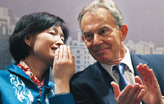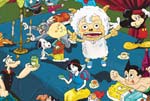Op-Ed Contributors
Food crisis requires urgent action
Updated: 2011-03-28 08:01
By Wei Ha (China Daily)
'Every man, woman and child has the inalienable right to be free from hunger and malnutrition in order to develop fully and maintain their physical and mental faculties, " says the Universal Declaration on the Eradication of Hunger and Malnutrition.
When the world's leaders gathered in Rome in 1974 for the World Food Conference convened by the General Assembly of the United Nations, they were entrusted with developing ways and means whereby the international community as a whole could take specific action to resolve the world food problem within the broader context of development and international economic co-operation. They surely never expected history to repeat itself, especially after the declaration was agreed and the solemn pledges they made.
|
||||
The recent surges in food prices reflect a confluence of factors, both from the supply side and the demand side. On the supply side, the "Green Revolution" has largely bypassed Africa and there is low agricultural productivity in Sub-Saharan Africa. The high subsidies for agriculture in developed countries have suppressed the price of food and inadequate investment in developing countries since 1970s has kept the production of food crops at sub-optimal levels. Against this backdrop, successive droughts in Australia and the Ukraine resulted in a bad wheat harvest in 2007, while spiraling oil prices have raised production and transportation costs. The feedback effect of policy responses such as export restrictions on food has further fueled the supply shortage.
On the demand side, the shift in diet from grain to meat in large developing countries such as China and India has increased the demand for grains, simply because it takes more grain to produce one kilogram of red meat. Second, rising biofuel production in the European Union and the United States - in response to higher oil prices and generous public subsidies - has also boosted demand. To put this in context, the grain needed to fill the tank of an SUV could feed a person for a year. Third, the sub-prime mortgage crisis has increased speculative activities in food and oil commodities as institutional investors look for higher returns.
Tackling this imbalance requires an overhaul of the policies regarding agricultural development. I summarize them as the four Is: insurance, incentives, innovation and infrastructure.
1. Insurance
At a global level, we need to fully fund the United Nations World Food Programme and Food and Agriculture Organization and strengthen their monitoring of global food production and price volatility. At the national level, countries with safety nets will need to expand and improve them, drawing on the recent success of Conditional Cash Transfer programs.
Building social safety nets is still a priority for other countries. Much can be learned from the Indonesian experience after the Asian Financial Crisis when the country quickly built its own program from scratch. Index-based weather derivatives are also a good step to insure farmers against covariate risk.
E-paper

Green mission
Tony blair believes China will take a leading role to fight climate change and cut emissions.
The spring of new professions
Real modern times
F1 sponsors expect returns from Shanghai stop
Specials

Share your China stories!
Foreign readers are invited to share your China stories.

Have you any wool?
The new stars of Chinese animation are edging out old childhood icons like Mickey Mouse and Hello Kitty.

Fill dad's shoes
Daughter and son are beginning to take over the family business of making shoes.



